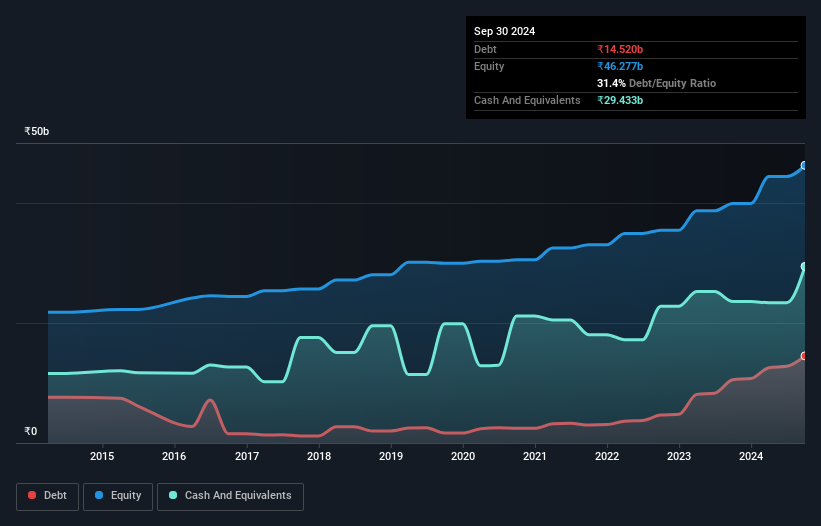
The external fund manager backed by Berkshire Hathaway's Charlie Munger, Li Lu, makes no bones about it when he says 'The biggest investment risk is not the volatility of prices, but whether you will suffer a permanent loss of capital.' So it seems the smart money knows that debt - which is usually involved in bankruptcies - is a very important factor, when you assess how risky a company is. We can see that Thermax Limited (NSE:THERMAX) does use debt in its business. But is this debt a concern to shareholders?
When Is Debt A Problem?
Debt assists a business until the business has trouble paying it off, either with new capital or with free cash flow. Part and parcel of capitalism is the process of 'creative destruction' where failed businesses are mercilessly liquidated by their bankers. However, a more usual (but still expensive) situation is where a company must dilute shareholders at a cheap share price simply to get debt under control. Of course, plenty of companies use debt to fund growth, without any negative consequences. When we examine debt levels, we first consider both cash and debt levels, together.
See our latest analysis for Thermax
How Much Debt Does Thermax Carry?
The image below, which you can click on for greater detail, shows that at September 2024 Thermax had debt of ₹14.5b, up from ₹10.6b in one year. But on the other hand it also has ₹29.4b in cash, leading to a ₹14.9b net cash position.

A Look At Thermax's Liabilities
The latest balance sheet data shows that Thermax had liabilities of ₹48.7b due within a year, and liabilities of ₹14.7b falling due after that. Offsetting these obligations, it had cash of ₹29.4b as well as receivables valued at ₹21.5b due within 12 months. So it has liabilities totalling ₹12.5b more than its cash and near-term receivables, combined.
Given Thermax has a market capitalization of ₹538.1b, it's hard to believe these liabilities pose much threat. Having said that, it's clear that we should continue to monitor its balance sheet, lest it change for the worse. Despite its noteworthy liabilities, Thermax boasts net cash, so it's fair to say it does not have a heavy debt load!
Another good sign is that Thermax has been able to increase its EBIT by 27% in twelve months, making it easier to pay down debt. When analysing debt levels, the balance sheet is the obvious place to start. But ultimately the future profitability of the business will decide if Thermax can strengthen its balance sheet over time. So if you're focused on the future you can check out this free report showing analyst profit forecasts.
But our final consideration is also important, because a company cannot pay debt with paper profits; it needs cold hard cash. While Thermax has net cash on its balance sheet, it's still worth taking a look at its ability to convert earnings before interest and tax (EBIT) to free cash flow, to help us understand how quickly it is building (or eroding) that cash balance. Over the last three years, Thermax saw substantial negative free cash flow, in total. While that may be a result of expenditure for growth, it does make the debt far more risky.
Summing Up
While it is always sensible to look at a company's total liabilities, it is very reassuring that Thermax has ₹14.9b in net cash. And it impressed us with its EBIT growth of 27% over the last year. So we are not troubled with Thermax's debt use. There's no doubt that we learn most about debt from the balance sheet. But ultimately, every company can contain risks that exist outside of the balance sheet. To that end, you should learn about the 2 warning signs we've spotted with Thermax (including 1 which is a bit unpleasant) .
If you're interested in investing in businesses that can grow profits without the burden of debt, then check out this free list of growing businesses that have net cash on the balance sheet.
Valuation is complex, but we're here to simplify it.
Discover if Thermax might be undervalued or overvalued with our detailed analysis, featuring fair value estimates, potential risks, dividends, insider trades, and its financial condition.
Access Free AnalysisHave feedback on this article? Concerned about the content? Get in touch with us directly. Alternatively, email editorial-team (at) simplywallst.com.
This article by Simply Wall St is general in nature. We provide commentary based on historical data and analyst forecasts only using an unbiased methodology and our articles are not intended to be financial advice. It does not constitute a recommendation to buy or sell any stock, and does not take account of your objectives, or your financial situation. We aim to bring you long-term focused analysis driven by fundamental data. Note that our analysis may not factor in the latest price-sensitive company announcements or qualitative material. Simply Wall St has no position in any stocks mentioned.
About NSEI:THERMAX
Thermax
Provides energy, environment, and chemical solutions in India and internationally.
Excellent balance sheet average dividend payer.
Similar Companies
Market Insights
Community Narratives



